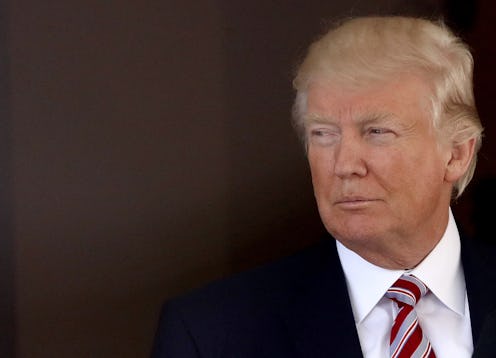News
Trump's Victim Complex Is Splitting The Country In Two

In a sad but unsurprising development, Donald Trump wants you to feel bad for him. A day after Deputy Attorney General Rod Rosenstein appointed a special prosecutor to oversee the FBI's investigation of links between the Trump campaign and the Russian government, Trump tweeted, "This is the single greatest witch hunt of a politician in American history!" If it wasn't already obvious, Trump has a serious victim complex, and it's splitting the country in two.
To start off with, Trump's claim is flatly untrue. There have been plenty of high-profile witch hunts in American political history, and many have easily eclipsed whatever Trump is going through right now. You had Sen. Joseph McCarthy, for instance, who claimed in 1950 that hundreds of "known communists" had infiltrated the U.S. State Department and spearheaded a fruitless Congressional investigation in order to identify them.
More recently, there were the seemingly-endless Congressional inquiries into the 2011 attacks on the U.S. consulate in Benghazi, which, despite the best efforts of the Republicans running them, uncovered no illegal action on anybody's part.
And let's not forget the actual Salem Witch Trials, in which a local officeholder was accused of being a witch and thrown in jail.
More importantly, what's happening to Trump isn't a witch hunt. A witch hunt, as broadly used, refers to an investigation into potential wrongdoing that's not based on solid evidence or facts. Although there are indeed several investigations into Trump and his presidential campaign's potential communications with Russia, they aren't unwarranted, though Trump denies having colluded with Russia when it comes to the 2016 election. The investigations are fully warranted, given the just how many connections between his associates and the Russian government have been both confirmed and alleged.
To take just the most recent example, Reuters reported on Thursday that the Trump campaign was in contact with Russian officials and associates at least 18 times during the last seven months of presidential campaign. That's not definitive evidence of collusion, of course — far from it! But it's also something that, at the very least, is worth looking into.
And yet Trump refuses to acknowledge any legitimacy to the investigations into him. Instead, he claims that he's the victim of a witch hunt and, during a separate interview, that the appointment of a special prosecutor "hurts our country terribly, because it shows we're a divided, mixed-up, not-unified country."
But in truth, it's Trump's self-pity that's dividing the country, not the investigations into his campaign and administration. When Trump insists, as he recently did in a fundraising email, that he's the victim of "sabotage" from within the U.S. government, a lot of people in his base believe him. A state assemblyman in New York whose district voted overwhelmingly for Trump said Thursday that, far from alienating his voters, Trump's Russia issues have only emboldened his supporters.
"Not only have I not heard of anyone turning their backs, I’ve seen people become more in solidarity with the president because they feel he’s getting a raw deal,” Ron Castorina said.
But in truth, Trump isn't being treated unfairly. By any rational historical assessment, his firing of FBI Director James Comey is a big deal. The fact that he hired Michael Flynn to serve as national security adviser, even though Flynn had told Trump's team that he was under investigation by the FBI for serving as an agent of the Turkish government, is also a big deal. If true, the allegation that Trump revealed highly classified intelligence to the Russian government during a recent Oval Office meeting — an allegation Trump has not denied — is also a huge deal.
All of this matters. By pretending that it doesn't, and instead emphasizing his own sense of victimhood, Trump is ripping America's already substantial political divides wide open, making it much harder for the country to unify at any point in the near future.